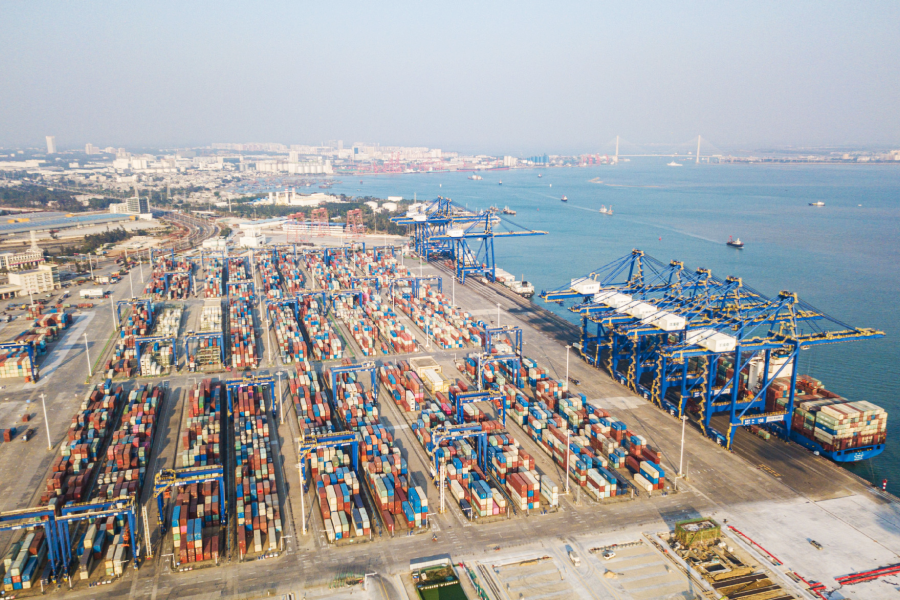Apr 12, 2025, 15:23

Drone photo taken on Jan 11, 2025 shows the Yangpu international container terminal in Yangpu Economic Development Zone, South China's Hainan province. [Photo/Xinhua]
Global Times-At a time when US tariffs are disrupting the global trade order in pursuit of a new "America First" order, the multilateralism represented by the World Trade Organization (WTO) becomes not only crucial for sustaining global trade stability but also imperative for averting a dangerous slide into zero-sum trade confrontations. China's recent actions at the WTO underscore this urgency.
China on Wednesday voiced grave concerns over the "reciprocal tariffs" imposed by the US and their detrimental impacts, urging the US to comply with the WTO rules to avoid an adverse impact on global economic stability and the multilateral trading system, at the first annual session of the WTO Council for Trade in Goods at Geneva, the Xinhua News Agency reported.
Notably, 46 WTO members echoed China's stance during the meeting, expressing concerns about "reciprocal tariffs" imposed by the US and calling on it to comply with the WTO rules.
The development reflects China's unwavering position on safeguarding the multilateral trading system and underscores a growing global consensus against unilateral trade coercion. As the world grapples with economic uncertainties exacerbated by protectionist policies, there is growing awareness that only by upholding the rules-based multilateral order can economies cope with the turbulence in global trade.
The global trade landscape is grappling with unprecedented challenges. The US government's flip-flops on its tariff policy have significantly disrupted economic stability, financial markets and the normal functioning of supply chains, undermining the multilateral principles upheld by the WTO.
While the US, as the prime beneficiary of economic globalization and the dollar-dominated financial system, has reaped immense advantages from free trade and the existing international economic order, it now willfully ignores this fact, resorting to unilateral coercion against other economies. The US maintains services trade surpluses with most major economies, totaling nearly $300 billion in 2024. American consumers have consistently benefited from high-quality, affordable goods through international trade, significantly enhancing living standards.
But still, Washington's trade policies, cloaked in the rhetoric of pursuing "fairness" and "reciprocity," follow the protectionist approach that exploits global trading rules to serve its own interests. When advantageous, the US embraces these rules, but otherwise, it discards them, resorting to tariffs as a form of coercion to force global trade to prioritize American interests above all else. This strategy not only undermines the principles of free trade but also risks destabilizing global supply chains by creating distrust and uncertainty.
Despite these challenges, it is still believed that multilateralism remains the inevitable path to resolving global difficulties. Thus, preserving the WTO's multilateral framework becomes ever more critical. The system exists to serve collective prosperity, not any individual country.
While the organization faces reform pressures, no alternative exists that matches its scale and rules-based structure. Its foundational principles - including most-favored-nation treatment, binding trade commitments and negotiated agreements - provided irreplaceable institutional safeguards for global commerce over the past decades.
Moreover, another important aspect of multilateralism's strength lies in its inclusivity and sustainability. A functional global trade architecture must balance developed economies' interests with developing nations' growth needs, fostering equitable progress. The WTO's differentiated treatment provisions enable emerging economies to integrate into global value chains while addressing structural disadvantages, a vital mechanism for bridging the North-South divide and ensuring the long-term stability of the global economy.
Therefore, how the WTO safeguards its authority and the international trading order in the current context is crucial for easing trade tensions and restoring confidence in the global trading system. It is hoped that the WTO will fully leverage its role and assert a stronger voice in steadfastly supporting multilateralism. By engaging in multilateral consultations and cooperation, the WTO can demonstrate the immense value and positive significance of free trade to the world, rekindling global confidence in shared economic future based on mutual benefits.
Even the United Nations are playing blind and deaf, what else can you expect from WTO? Will its voice be louder than that of the UN? Or will it send representatives to the US giving pressure on Donald Trump?
At the critical moments of history, it is only the people of the country that can have a say in determining their future.
Community login







Add a comment